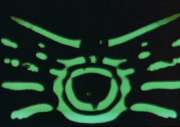Well now...
First post for a while, but then the first bit of new Doctor Who on the telly for a while. And I'm still trying to get over Last of the Time Lords. So has this helped at all? The fact that Time Crash can be slotted into that final episode might give it a bit more of a feelgood factor in future viewings. We can only hope...
First post for a while, but then the first bit of new Doctor Who on the telly for a while. And I'm still trying to get over Last of the Time Lords. So has this helped at all? The fact that Time Crash can be slotted into that final episode might give it a bit more of a feelgood factor in future viewings. We can only hope...
What did I think of Time Crash then? Reading through the comments on Outpost Gallifrey, I sometimes (no, make that often) wonder if I've watched the same programme as everyone else. Suffice it to say, I didn't cry, and I haven't watched it twenty times yet. I found it perfectly acceptable as a charity episode: entertaining and fun, with nice interaction between the two leads - good to see Davison back in character. Great while it lasted, but that was all. Probably I'm coming across as a bit of an old curmudgeon here. It's not that I don't engage with Doctor Who on an emotional level - my major difficulty is that the bit which seems to have moved people is the bit I have the most problems with: the tenth Doctor's bizarre eulogizing of the fifth, especially the "You were my Doctor" speech. It's not so much that it breaks the fourth wall - I'm all for a bit of post-modernism - more the fact that it steps outside the characters and seems to become the writer and actor directly addressing their hero. Which just feels very, very strange.
There are some interesting continuity ideas though. Shorting out of the time differential as an explanation for why past Doctors look older in reunion episodes (although the pedant in me would point out that it doesn't account for why Troughton and Pertwee look older before they're scooped in The Five Doctors, but you can't have everything). There's also the question of whether the Doctor can remember his meetings with his other incarnations once he returns to his own time: why for instance, doesn't the fifth Doctor know Borusa's the villain in The Five Doctors if he's lived through it four times already? (I remember there was even a letter to the Radio Times in 1983 asking about that...) Considering the resolution of Time Crash depends on Tennant remembering what he had to do to save the day, one can only conclude that the Doctor does in fact remember these things. But then, doesn't that mean Davison will know he's not going to die on Androzani? that the Master isn't dead on Sarn? and so on and so on. One suggestion is that these anomalous memories are somehow lost in the time differential - they're memories that belong to the tenth Doctor's part of the time stream; when the time differential shorts out, in addition to physically ageing Davison, it somehow unlocks Tennant's memory of the incident. (It's an explanation that would work in most cases - although Troughton recalls the events of The Three Doctors before he gets scooped in The Five Doctors, so nothing's perfect...)
There's been some debate on when exactly in the fifth Doctor's life this event occurs for him. Plenty of speculation and lots of suggested answers. To place the story in The Complete Adventures, I had to make some quick decisions on the night - and the most obvious clues to pick up on were those that Tennant suggested: Nyssa and Tegan, Mara - a placing between Snakedance and Mawdryn Undead seems to work. Davison doesn't confirm it, but he doesn't deny it either - and as I've just discussed, Tennant ought to be able to remember it! In the absence of any other clues, I'll stick with my original guess. (Though I've no doubt a book or audio will come along in years to come and tie it down definitely...) It's been pointed out to me that Mawdryn Undead opens with the Tardis nearly colliding with another spaceship, which offers a neat sense of symmetry.
There's been some debate on when exactly in the fifth Doctor's life this event occurs for him. Plenty of speculation and lots of suggested answers. To place the story in The Complete Adventures, I had to make some quick decisions on the night - and the most obvious clues to pick up on were those that Tennant suggested: Nyssa and Tegan, Mara - a placing between Snakedance and Mawdryn Undead seems to work. Davison doesn't confirm it, but he doesn't deny it either - and as I've just discussed, Tennant ought to be able to remember it! In the absence of any other clues, I'll stick with my original guess. (Though I've no doubt a book or audio will come along in years to come and tie it down definitely...) It's been pointed out to me that Mawdryn Undead opens with the Tardis nearly colliding with another spaceship, which offers a neat sense of symmetry.

